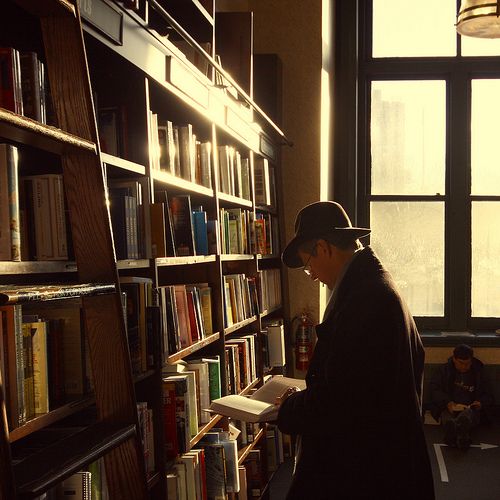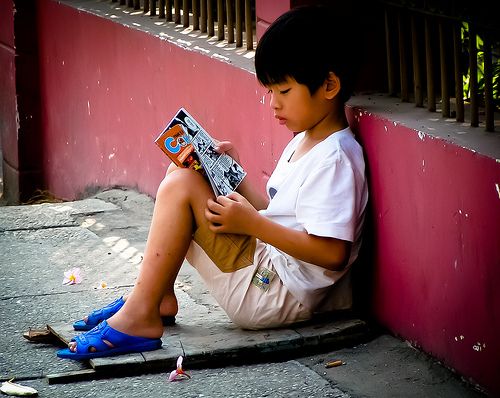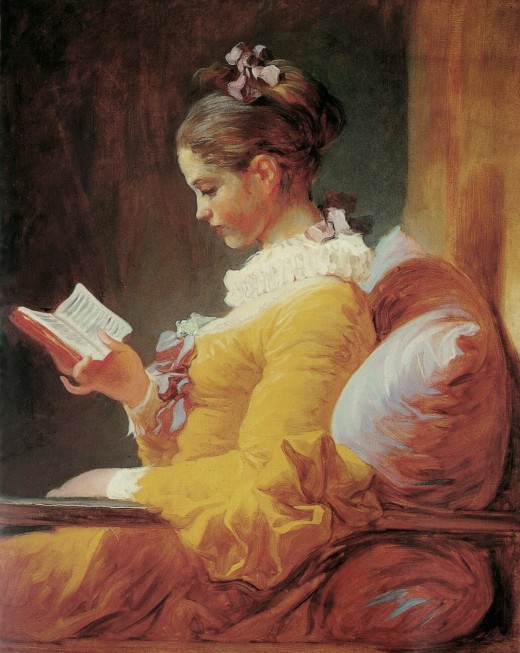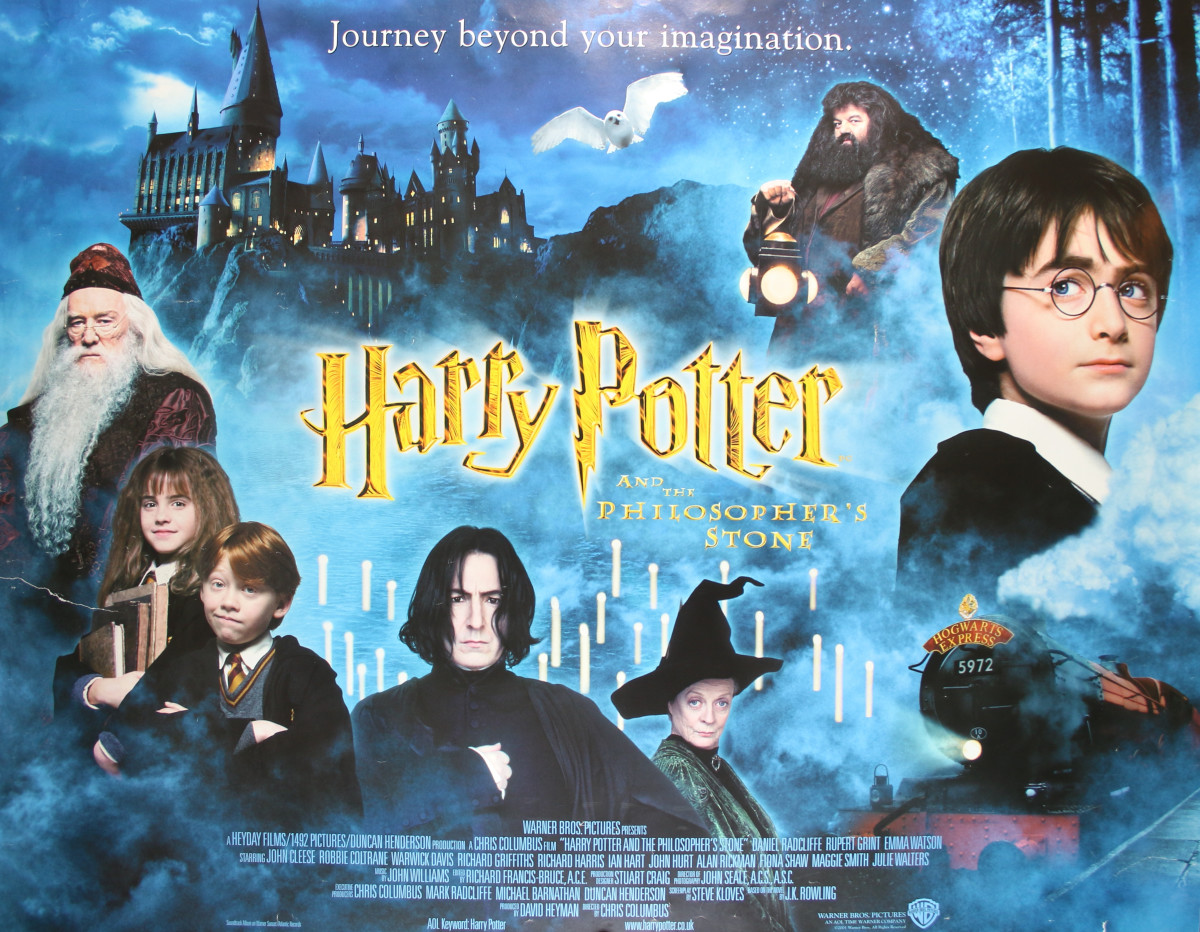Interview in the educational trenches: Zoe Heukels

by Nils Visser
I thought I would have plenty to say on youth literature and I do but ran out of steam for a while. Then it occurred to me that, having already given this assignment a very broad interpretation, it would be, erm, very educational for me to listen to someone else, someone with loads of experience in teaching the stuff. So I opted to examine John Boyne’s Boy in the Striped Pyjamas and Mark Haddon’s Curious Incident of the Dog in the Night-time by means of an interview with Zoe Heukels, who has been teaching International Baccalaureate literature to TTO students for a dozen years.
Truth be told, I was also looking for an easy way out of time expenditure, but discovered that organizing an interview and ensuring the questions were interesting took just as much time as writing a piece of my own. Bummer.
None-the-less, it was nice to talk about books with someone and do so from a teacher´s perspective.
Q. Thanks ever so much for making some time for me. Can you briefly tell me at what kind of school you teach?
A. I’ve taught in a bilingual secondary school for twelve years. I teach 4th, 5th and 6th form VWO classes and I teach them the International Baccalaureate English A2 Language and Literature course.
Q. Do you have any `Onderbouw´ experience? (lower forms, i.e. Junior High)
A. I have onderbouw experience, but haven’t taught onderbouw classes for six years. My onderbouw classes were also in the English bilingual department.
Q. So, International Baccalaureate, that sounds like there is a lot of literature to cover.
A. Absolutely, I need to cover 12 works for the course, we deal with novels, plays, poetry, essays and rhetoric.
Q. Does the IB have a mandatory list of books to read?
A. There’s a mandatory list, for this year there’s also a new program that involves World Literature, not just English literature.
Q. Any choice to be had?
A. We have some choice, but we need to cover three different literary periods, from three different continents and authors from both genders.
Q. When deciding what you are going to read within those guidelines, what do you look for in a good book?
A. We look for themes which offer good points for discussion, books that offer literary devices, and books which I think my students will enjoy.
Q. How do you decide the latter?
A. Depends on the class, depends on the year. You know your students, so it’s a feeling, you reckon you can anticipate what they enjoy and adapt your literature choices to the class.
Q. Does that mean you might have parallel classes and actually be reading two different books in each of them?
A. Sure, that happens all of the time.
Q. Isn´t that a lot of extra work?
A. Yes indeed. But I´m a teacher because I hope to make a difference for students, give them something that will be useful to them in later life. If that requires a bit of extra work, so be it. I didn´t become a teacher to try and reduce my workload to a minimum.
Q. Point taken. What kind of books did you read in the Onderbouw?
A. We read Skellig by David Almond, we read The Lion, The Witch and the Wardrobe by C.S. Lewis, we read To Kill a Mockingbird by Harper Lee and The Beach by Alex Garland. Those sort of books.
Q. To Kill a Mockingbird in the Onderbouw, that indicates something about the level of English in Bilingual Education, doesn’t it?
A. Yes. Absolutely. Our students have six hours of English in year one and two, and five hours a week in year three. We read Mockingbird after half term in year three, by that time their English is good enough for Scout, Jem and Boo Radley.
Q. Sounds like heaven. Getting that many hours for English.
A. Lovely, you get to know your children well, and get to cover a lot of ground in class. It´s not just literature of course, but we have a lot more time to spend on reading than regular programs.


























Q. In many schools, unfortunately, reading is so out of fashion that kids get to read the Dutch translations and questions are so piss-poor that they get away with reading the Wikipedia summaries.
A. I´ve heard, actually, I know schools where that happens. But Brussels and the European Framework are trying to resurrect literature as a serious subject. At some points schools are going to have to follow EU guidelines instead of just teaching partial English by focusing on exam related exercises only.
Q. One could even say that reading literature is pretty useful for those exams at any rate?
A. Certainly. Reading literature helps students to read for broad contextual understanding instead of trying to understand every minute detail. Given the right assignments it also helps them to understand textual structure, it increases their vocabulary and helps them to understand cultural context a great deal better. The type of media articles used for the Dutch examination often contain references which the author assumes all readers understand because they are familiar with iconic literature.
Q. There’s a couple of specific books I’d like to ask you about. How suitable do you rate A Curious Incident by Mark Haddon for reading in school?
A. Surely you mean A Curious Incident of the Dog in the Night-time? Very suitable, we read Curious Incident in year 4, obviously it’s not just the theme you can talk about, but there’s a lot of stylistic devices in the book that are suitable to teach. Also, the kids enjoy it, it’s a hit every single year.
Q. You’ve read it more than once then?
A. Yes, we’ve been reading it for the last five years.
Q. Why do the kids enjoy it, life described from an autistic perspective isn’t the most obvious choice for teenage reading?
A. Well, that depends. There’s always a student in class with the Syndrome of Asperger. So they can relate to their fellow student. Since it’s written from Christopher Boone’s perspective, the story is very accessible and comprehendible, and at some moments even funny. It offers the students insight in the mind of someone who’s autistic. Hopefully on a higher level it will make them more tolerant of people who’re just a bit different.
Q. My favourite scene is where a neighbour talks to Christopher, and he ignores it, explaining that he recognizes the talk as chitchat, which has no point, therefore feedback is not required. Do you recognize this as typical behaviour?
A. Well yes, that and the fact that they take things very literally and don’t usually emphasize with the people around them.
Q. More importantly, do the kids in your class with Asperge recognize Christopher’s behaviour?
A. I think they do, but’s it’s never come up in a class discussion.
Q. Do they contribute to the class discussions?
A. Sometimes they do. But it wouldn’t be about feelings, it would be more analytical, as in the stylistic devices or the use of language.
Q. So, you have a class, and a teacher, who are all aware that, let’s say Benjamin, is like Christopher….
A. I’m not necessarily sure that all my students would be aware Benjamin is in a similar situation to Christopher. As I said, I hope it makes students more tolerant of those who are different, and I mean that in general. It wouldn´t do to single out one student and make him or her a study object for the rest of the class.
Q. Ok, another book. Suitability for school. Boy in the Striped…..
A. …Pyjamas by John Boyne.
Q. You know the book. Have you read it for school?
A. It’s an individual choice book for students, so we don’t read it as a class, but I do recommend it to students, because I’m positive that students will enjoy it, and they always do.
Q. Do you know why they enjoy it?
A. The first thing you or I might think of is the obvious theme of World War 2, but for the students it’s the theme of the equality or inequality of friendship that they can relate to. This story is told from the perspective of the protagonist, in this case Bruno, a nine year old boy. It is with the innocence of this child’s perspective that he tells about the horrors of a place he calls Out-With. My students always sympathize with Bruno, and therefore they thoroughly enjoy the book.
Q. It seems to me that books with this perspective work well, i.e. Mockingbird, Roll of Thunder Hear My Cry. Why do you think this is?
A. Because it’s a person who’s much closer to the student with respect to age, or the innocence of the narrator is appealing.
Q. You mentioned Auschwitz in Striped Pyjamas. In one school in the States, The Diary of Anne Frank has been banned from school because it’s too “depressing”. Your thoughts on this?
A. Absolutely ridiculous. I am at a loss for words. Now that’s depressing.
Q. Other schools banned Anne Frank because of its sexual content. Any thoughts on that?
A. Flabbergasted. I think every topic needs to be discussed with students, even though we may feel uncomfortable with it. If we teach them that some things are not to be talked about, how can we ever live in a world where we can be honest about what we feel and think?
Q. So that includes sexual content?
A. Yes, absolutely. Sure, like I said, every topic needs to be dealt with
Q. Would it surprise you to know that Curious Incident has been banned at public libraries and schools in the USA?
A. After what you told me about Anne Frank being banned, no. But on a personal level: it’s hard to believe.
Q. Can you think of reasons why?
A. No I really can’t.
Q. Foul language (the F-Word), the mother has an affair, and in a failed so-called challenge in Texas, it was claimed the book could “pollute” young minds. Speaking of the F-Word. Judy Blume wrote “That’s not a bad word, hate and war are bad words, fuck isn’t.” Would you agree with her?
A. Certainly. I don’t use it in class, but usually in literature it reflects how people really talk. Art imitates life. Certainly not a reason to ban a book, but I can’t really think of any reason to ban books.
Q. Or burn them?
A. They used to do that, yes. Very silly, you can’t kill ideas.
Q. They still do.
A. Surely not? Where, North Korea? Iran?
Q. No, the United States. New editions of the Harry Potter books were accompanied by book burnings where the new editions, and other seditious materials, were tossed on fires
A. Harry Potter?
Q. “Thou Shalt not Suffer a Witch to Live.”
A. Unbelievable.
Q. Back to Curious Incident. A lot of criticism on this book revolves around children with Asperger Syndrome complaining that Christopher isn’t really like anyone with AS, i.e. the mix of symptoms is inconsistent with the real thing. Can you comment on that?
A. Personalities differ for everyone, there isn’t a single type of AS or autism that applies to everyone. Autists tend to think from their own perspective, so if Christopher differs from them, it will appear unreal to them.
Q. Mark Haddon is often asked by readers whether he did specific research into Asperger’s Syndrome before he wrote the novel. Here is what he said:
“I did no specific research at all. Many years ago I worked with people with a variety of disabilities….so I feel comfortable writing about the subject and have what you might call an interested layperson’s knowledge of autism and Asperger’s. Beyond that I reasoned…that the novel would work best if I simply tried to make Christopher seem like a believable human being, rather than trying to make him medically ‘correct’” Do you think he succeeded?
A. I think he succeeded, what I don’t believe in is over analyzing everything. It’s a good book, a good story, the kids like it.
Q. “Persons attempting to find a motive in this narrative will be prosecuted; persons attempting to find a moral in it will be banished; persons attempting to find a plot in it will be shot.”
A. Mark Twain. Absolutely. Shoot them.
Q. Some people might find that ironic, seeing that it’s your job to teach motive, moral and plot.
A. To analyze it yes, not to overanalyze it. There’s no reason to find things to criticize in everything, sometimes it’s best to just enjoy a story. Without that enjoyment all reading becomes mandatory, hardly very motivational. I always hope my kids continue to read after they’ve obtained their diploma. That would be my real achievement.

Q. Back to analyzing Haddon. Some of the critics who have Asperger Syndrome themselves complain about the lack of empathy on behalf of Christopher. They admit they’re hard to get along with at times, and have difficulty relating to emotions, but they’re not entirely devoid of human feeling. Would you agree that empathy is an important part of literature? As in liking characters, liking stories?
A. There is a difference between empathy and sympathy. I feel sympathy for Christopher, but since I’m on the other side of the spectrum, namely hyper-social, I don’t feel empathy. That doesn’t mean I can’t enjoy the book.
Q. Regardless of inconsistencies, the book at least offers the reader an insight into what it’s like to live a life where you experience the world in a very different way. Seeing as to how you pointed out that almost every class has someone like Christopher in it, do you think this book should be mandatory reading at teacher training courses? I.e. Should every teacher or wannabe teacher be made to read this book?
A. This is a bit of a silly question, I don’t believe in making people read books, there are other works teachers should read if you’re going to make them read books. This is an enjoyable read, it might help them understand these kids better, but it doesn’t deal with matters of life and death and moral virtues. For that, see the Holy Bible, the Quran and the Tibetan Book of the Dead. But are you going to make people read those? Reading should be a choice.
Q. Cheeky question: what about the IB book list? Isn’t that making people read something?
A. No, it’s offering good works, plus, students chose to do the IB program, and they knew what was going to be involved.
Q. Do you discuss general criticism of a book, such as the Haddon stuff we just talked about, with your students?
A. Yes, absolutely. However, they need to make up their own minds, and be able to argue why they take on certain opinions. It’s only by sharing opinions that you can truly understand someone’s beliefs and motivations. There’s no right or wrong in what they think of a character or novel as long as they can explain why. Everything is about argumentation and eloquence. And humour, we mustn’t forget humour.
Q. The boy in Striped Pajamas is criticized for a number of reasons. One is inaccuracy. Boys aged nine would have been gassed immediately on arrival at Auschwitz. Do you think it is morally acceptable to use artistic license with a topic like this? Why?
A. Yes I do. It’s a novel, it’s John Boyne’s imagination at work, his world. His motivation was to deal with an aspect of war. He didn’t do anything wrong by changing such a detail. Do you think it was wrong?
Q. No, kids read it, they might not read other works. So it educates and keeps the memories of camps alive, besides I can have additional assignments for further study and thereby supply more historically accurate information.

A. Yes, and I would have missed lots of very interesting discussion by the students, who pick up on a lot of themes we miss, because we focus on the World War topic. Issues of racism, friendships, father-son relations and identity.
Q. I’m going to name two other items of criticism. Can you tell me your thoughts on this?
Manhola Dargis, of the New York Times, wrote that the movie is akin to “the Holocaust trivialized, glossed over, kitsched up, commercially exploited and hijacked for a tragedy about a Nazi family.”
A. Reminds me of Oscar Wilde, Wilde said: “The play trivializes serious matters and solemnizes trivial matters.” A different context obviously, but there are parallels. Serious matters are the hundreds of thousands of shoes and other personal belongings which form statistics. Statistics don’t allow you to feel a story. Trivial things do. The movie star postcards Anne Frank hung above her bed, the conversations between two boys by a fence. Where possible, people in the camps, -when not being murdered- argued, got married, had intercourse, gossiped. They weren’t in continual awe of the great momentous event they were caught up in. Read Primo Levi. Or Dale Carnegie, he wrote: “Any fool can criticize, condemn and complain – and most fools do.
Q. Stephanie Zacharek, reviewing for the Salon, wrote “There are plenty of subjects – old yellow hunting dogs, spirited folk bravely facing cancer – that can be easily milked for maximum pathos. But you’ve reached rock bottom when you start milking the death camps.”
A. In my opinion John Boyne wasn’t trying to make a quick buck by a cheap play on people’s emotions. The pathos is in the innocence. Does Mrs Zacharek actually understand pathos? Or realize the difference between the viewpoint of a modern metropolitan citizen and a nine year old boy in the forties?
Q. None-the-less, there’s a few issues here that seem quite serious. Bruno’s apparent ignorance of what his father does, what the fence really means and the industrial murder that is taking place echoes the excuse many people living in the vicinity of the camp used afterwards “wir haben es nicht gewusst”, we didn’t know. Survivors say this is impossible, they say the transport trains that travelled to the camps were accompanied by screams and cry for help, the air around the camps stank of burning human flesh and was filled with ashes from the crematoria.
A. Boyne refers to the smell, and the ashes and the big chimneys, Bruno doesn’t get what they are, the reader does. Boyne isn’t denying anything, he’s presenting a perspective. Bruno can’t even pronounce Auschwitz, he calls it Out-with. It’s interesting to ask students the question: When did you realize it was Auschwitz? Not deal with critics trying to sound intelligent. They raise interesting questions, but mustn’t pretend they’re drinking coffee from the Holy Grail. Sorry to keep using quotations, but they’re very apt. Kurt Vonnegut said: “Any reviewer who expresses rage and loathing for a novel is preposterous. He or she is like a person who has put on full armor and attacked a hot fudge sundae.” Someone else, I forgot who, asked how many statues and memorials were built for critics.
Q. When did you realize it was Auschwitz?
A. The title was a first hint, then the explanation that he had to move away from Berlin for his father’s work, I sort of saw it coming.
Q. One last banning response please. Various US schools have banned the Merriam Webster and American Heritage Dictionaries for not having appropriate content. I.e. definitions related to sexual matters. What say you?
A. Make a Teletubby dictionary? I don’t know, the levels of absurdity are incredible, it’s like they’re trying to erase life.
Q. Thank you very much for your time.
A. You’re welcome.





